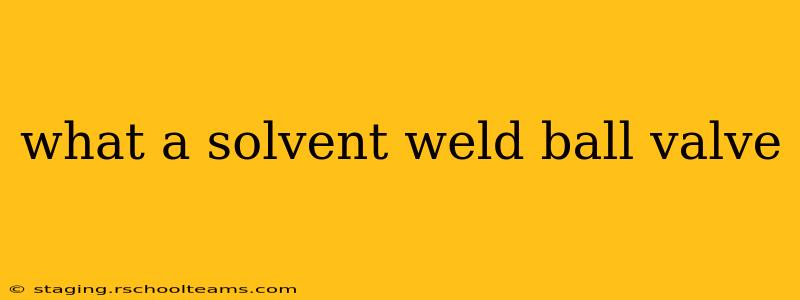What is a Solvent Weld Ball Valve?
A solvent weld ball valve is a type of ball valve that uses solvent welding as its primary joining method. Unlike threaded or flanged valves, solvent weld valves are permanently joined to the pipe system using a solvent cement that melts and fuses the plastic materials together, creating a strong, leak-proof seal. This makes them particularly suitable for applications requiring high pressure and leak-free operation. They are commonly used with plastic piping systems, like PVC, CPVC, and ABS.
Let's delve deeper into the specifics of these valves and address some frequently asked questions.
What are the advantages of a solvent weld ball valve?
Solvent weld ball valves offer several key advantages:
- Superior Seal: The solvent welding process creates a very strong and reliable seal, minimizing the risk of leaks even under high pressure. This is significantly better than threaded connections, which can loosen over time or become susceptible to leaks.
- Durability: The fused joint is exceptionally durable and resistant to corrosion and degradation, leading to a longer lifespan compared to other connection types.
- Smooth Flow: The smooth internal bore of the ball valve minimizes friction and pressure drop, ensuring efficient fluid flow.
- Ease of Installation (for experienced installers): While requiring specific expertise, the process is relatively quick once mastered, and fewer components are needed compared to flanged connections.
- Cost-Effective (in the long run): While the initial installation might require skilled labor, the long lifespan and reduced maintenance needs translate into cost savings in the long term.
What are the disadvantages of a solvent weld ball valve?
While offering significant benefits, solvent weld ball valves also have some drawbacks:
- Permanent Connection: Once welded, the valve cannot be easily removed or replaced. This necessitates careful planning during installation.
- Specialized Installation: The solvent welding process demands specific skills and knowledge to ensure a proper and leak-free joint. Improper welding can lead to leaks or damage to the valve.
- Material Limitations: Solvent welding is primarily suitable for specific thermoplastic materials like PVC, CPVC, and ABS. It's not compatible with all types of piping.
- Limited Repair Options: Repairing a damaged solvent weld joint is generally more difficult and expensive than repairing other types of connections.
What materials are typically used in solvent weld ball valves?
Solvent weld ball valves are typically constructed from materials compatible with solvent welding, including:
- PVC (Polyvinyl Chloride): A common and cost-effective material suitable for many applications.
- CPVC (Chlorinated Polyvinyl Chloride): Offers higher temperature and pressure resistance compared to PVC.
- ABS (Acrylonitrile Butadiene Styrene): Another thermoplastic material with good impact resistance.
What are the common applications of solvent weld ball valves?
These valves find widespread use in various applications where a reliable and leak-proof connection is essential:
- Water Distribution Systems: In both residential and commercial settings, they are used for controlling water flow.
- Chemical Processing: Suitable for handling certain chemicals compatible with the valve material.
- Irrigation Systems: Used for controlling water flow in irrigation networks.
- Industrial Applications: Found in various industrial processes requiring reliable fluid control.
How do you install a solvent weld ball valve?
The installation process involves preparing the pipe ends, applying solvent cement, and then joining the valve to the pipes. This process requires specialized tools and expertise. Improper installation can lead to leaks and should only be performed by qualified professionals. Refer to the manufacturer's instructions for specific details and safety precautions.
What sizes are solvent weld ball valves available in?
Solvent weld ball valves are available in a wide range of sizes, typically ranging from ½ inch to 6 inches or larger, depending on the manufacturer and application.
In conclusion, solvent weld ball valves offer a robust and reliable solution for various applications where a permanent, leak-free connection is crucial. However, their installation requires specialized skills, and the permanent nature of the connection necessitates careful planning. Choosing the right valve depends on the specific application, material compatibility, and pressure requirements. Always consult with a qualified professional for installation and selection guidance.
